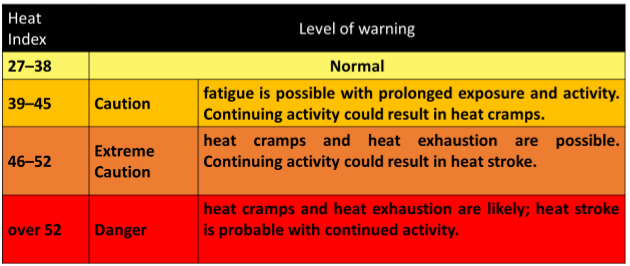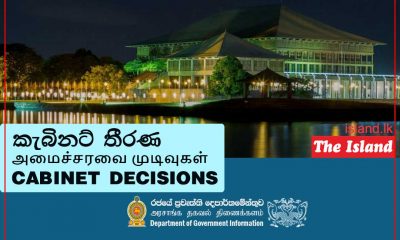News
WB: South Asia needs equitable cooling as heatwaves worsen

*** This spring, temperatures hit nearly 50 degree Celsius across India and Pakistan, while Bangladesh and Sri Lanka sweltered under unusually high heat
Without adequate cooling, these conditions undermine countries’ development. When blistering heat strikes South Asia, the poor and most vulnerable, suffer the worst impacts. When it is too hot to work, wages are lost, pushing families into cycles of poverty. School hours are cut short, depriving children of education and future opportunities, says a World Bank report.
It said: The latest report by the Intergovernmental Panel on Climate Change highlights that climate change is making heatwaves more likely. This spring, temperatures hit nearly 50 degree Celsius across India and Pakistan, while Bangladesh and Sri Lanka sweltered under unusually high heat. A study found that the heatwave across India and Pakistan was 30 times more likely this year than 100 years ago, due to climate change.
At home, where many people in South Asia live in inadequately ventilated buildings without access to cooling, extreme heat harms people’s health. Meanwhile, fragmented cold chain infrastructure leads to the loss of food and vaccines, putting nutrition and public health at risk.
The economic costs are staggering. With a large percentage of the region’s gross domestic product (GDP) reliant on the heat-stressed shoulders of informal workers, extreme heat does not just jeopardise the health and livelihoods of the working poor, but also the economic productivity of the region. By 2030, lost labour due to rising heat and humidity could risk up to 4.5% of India’s GDP – approximately USD 150-250 billion. Pakistan and Bangladesh could suffer losses of up to 5% of their GDP.
As urban populations grow and temperatures rise across South Asia, so too does the demand for cooling. Keeping citizens cool while mitigating the environmental impacts – air conditioners and other cooling equipment release powerful greenhouse gases – is a challenge for governments across South Asia, which must prioritise cooling as a development strategy.
In 2019, India became one of the first countries in the world to launch a comprehensive cooling action plan – the India Cooling Action Plan (ICAP), an ambitious initiative to address the country’s cooling needs while reducing climate impacts. In June 2022, Bangladesh published its own National Cooling Plan, while in October last year Pakistan announced it will adopt one by 2026.
Take South Asia’s cities, for example, many of which are plagued by high levels of poverty and bad housing conditions. More than 200 million new homes need to be built in South Asia before 2050 to meet housing needs. This provides an opportunity to change the course of urban development in the region and adopt strategies that prioritise thermal comfort. India, Pakistan and Bangladesh are responding to this challenge with affordable housing programmes.
In India, where 10 million new homes need to be built annually to keep up with housing demand, the government’s affordable housing scheme has the opportunity to incorporate nature-based solutions and passive cooling techniques – to prevent heat from building up within homes – into construction and urban planning. That means using climate-friendly insulation materials, like straw, combined with materials that have high thermal mass. According to World Bank Group analysis, space cooling in India alone presents a USD 1.5 trillion opportunity by 2040, of which USD 1.25 trillion is earmarked for residential buildings.
Opportunities to scale up affordable space-cooling technologies exist in housing schemes across the region. In Bangladesh, where the urban population grew from 31 million in 2000 to 65 million in 2020, the World Bank estimates that 250,000 new houses need to be built every year to meet existing shortages . In Pakistan, the government launched a housing programme in 2019 to provide five million housing units for poor and middle-income communities by 2030.
Scaling up high-efficiency common household appliances like brushless ceiling, or BLDC, fans can ensure comfort for millions of people. With ceiling fans among the fastest-selling appliances in the Asia-Pacific region, brushless fans require approximately 65% less energy than regular fans and help save around USD 20 per fan each year in household energy bills. This has been done before. India, for instance, has already seen the uptake of transformative energy-efficient technology at scale with nationwide bulk procurement and distribution of LED lightbulbs. Replicating the LED programme to create a viable market for other energy-efficient technologies like brushless fans also creates an opportunity for economic growth in the region.
Latest News
Heat index, is likely to increase up to ‘Caution level’ at some places in Northern, Eastern and North-central provinces and Monaragala and Hambantota districts

Warm Weather Advisory
Issued by the Natural Hazards Early Warning Centre of the Department of Meteorology at 3.30 p.m. 29 April 2025, valid for 30 April 2025
The general public are warned that the Heat index, the temperature felt on human body is likely to increase up to ‘Caution level’ at some places in Northern, Eastern and North-central provinces and Monaragala and Hambantota districts
The Heat Index Forecast is calculated by using relative humidity and maximum temperature and this is the condition that is felt on your body. This is not the forecast of maximum temperature. It is generated by the Department of Meteorology for the next day period and prepared by using global numerical weather prediction model data.

Effect of the heat index on human body is mentioned in the above table and it is prepared on the advice of the Ministry of Health and Indigenous Medical Services.
ACTION REQUIRED
Job sites: Stay hydrated and takes breaks in the shade as often as possible.
Indoors: Check up on the elderly and the sick.
Vehicles: Never leave children unattended.
Outdoors: Limit strenuous outdoor activities, find shade and stay hydrated.
Dress: Wear lightweight and white or light-colored clothing.
Note:
In addition, please refer to advisories issued by the Disaster Preparedness & Response Division, Ministry of Health in this regard as well. For further clarifications please contact 011-7446491.
News
AKD’s fourth state visit

President Anura Kumara Dissanayake will undertake a four-day state visit to Vietnam on 03 May, Cabinet Spokesman Minister Dr. Nalinda Jayatissa said. Since the presidential election, President Dissanayake has so far visited India, China and the UAE.
News
Sri Lanka-Pakistan bilateral defence dialogue strengthens strategic ties – MoD

The 5th annual Sri Lanka-Pakistan Bilateral Defence Dialogue commenced on Monday (April 28) in Islamabad, Pakistan, marking a continued commitment to strengthening defence cooperation between the two nations.
The MoD statement: “The Sri Lankan delegation is led by Defence Secretary Air Vice Marshal (retd.) Sampath Thuyacontha accompanied by Commander of the Navy, Vice Admiral Kanchana Banagoda, and Additional Secretary (Defence) of the Ministry of Defence Jayantha Edirisinghe. The Pakistani delegation is headed by Lieutenant General (retd.) Muhammad Ali, Secretary Defence of the Islamic Republic of Pakistan.
In conjunction with the on-going defence dialogue, Defence Secretary Thuyacontha held a side-line meeting yesterday (April 29) with Defence Minister of Pakistan, Khawaja Muhammad Asif.
These high-level engagements aim to enhance bilateral cooperation, foster mutual understanding on regional security dynamics and explore opportunities for defence collaboration. Both nations share a longstanding relationship rooted in mutual respect and strategic cooperation. The dialogue reflects the growing importance of partnerships in maintaining stability and promoting peace in the South Asian region.
The three-day dialogue, which concludes today (April 30), is expected to reinforce bilateral defence ties and contribute to broader regional security objectives.
-

 Business3 days ago
Business3 days agoPick My Pet wins Best Pet Boarding and Grooming Facilitator award
-

 News3 days ago
News3 days agoNew Lankan HC to Australia assumes duties
-

 News3 days ago
News3 days agoLankan ‘snow-white’ monkeys become a magnet for tourists
-

 News1 day ago
News1 day agoJapan-funded anti-corruption project launched again
-

 Features3 days ago
Features3 days agoKing Donald and the executive presidency
-

 Business3 days ago
Business3 days agoACHE Honoured as best institute for American-standard education
-

 Features5 days ago
Features5 days agoThe Truth will set us free – I
-

 Business1 day ago
Business1 day agoNational Savings Bank appoints Ajith Akmeemana,Chief Financial Officer
























